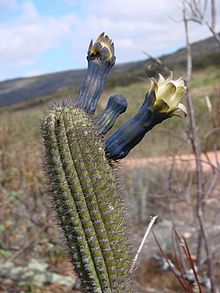Cipocereus: Difference between revisions
No edit summary |
|||
| Line 22: | Line 22: | ||
==Species== |
==Species== |
||
Species of the genus ''Cipocereus'' according to [[Plants of the World Online]] {{as of|2023|August}}:<ref name="Plants of the World Online z155">{{cite web | title=Cipocereus F.Ritter | website=Plants of the World Online | url=http://powo.science.kew.org/taxon/urn:lsid:ipni.org:names:892977-1 | access-date=2023-08-10}}</ref> |
|||
{| class="wikitable" |
{| class="wikitable" |
||
|- |
|- |
||
| Line 39: | Line 40: | ||
|- |
|- |
||
|} |
|} |
||
==Synonymy== |
==Synonymy== |
||
The genus '''''Floribunda''''' <small>[[F.Ritter]]</small> has been brought into synonymy with this genus. |
The genus '''''Floribunda''''' <small>[[F.Ritter]]</small> has been brought into synonymy with this genus. |
||
Revision as of 06:32, 10 August 2023
| Cipocereus | |
|---|---|

| |
| Cipocereus minensis | |
| Scientific classification | |
| Kingdom: | Plantae |
| Clade: | Tracheophytes |
| Clade: | Angiosperms |
| Clade: | Eudicots |
| Order: | Caryophyllales |
| Family: | Cactaceae |
| Subfamily: | Cactoideae |
| Subtribe: | Cereinae |
| Genus: | Cipocereus F.Ritter |
| Type species | |
| Cipocereus pleurocarpus | |
| Species | |
|
See text. | |
| Synonyms | |
| |
Cipocereus is a genus of cacti from Brazil.[1][2] These species were previously included in the genera Pilosocereus and Cereus.
Description
The plants of the genus Cipocereus is bushy, sometimes branched and columnar growing reach heights of growth of up to 3.5 meters. The cylindrical, somewhat woody shoots are 2 to 5 centimeters in diameter. On the 4 to 21 ribs are round, white or brown areoles from which a few to many thorns arise, which can sometimes be missing and are of variable shape.
The white, tubular flowers open at night and sometimes remain open into the following day. The pericarp and floral tube are ribbed, more or less round in cross-section, and coated with a thick blue wax. The scales are narrow and widely spaced.
The spherical to egg-shaped, not splitting fruits are overgrown with intensive grey-blue. The remainder of the flowers is perennial. The brownish black to black, more or less dull seeds are broadly oval and 1 to 2 millimeters long.
Species
Species of the genus Cipocereus according to Plants of the World Online As of August 2023[update]:[3]
| Image | Scientific name | Distribution |
|---|---|---|
 |
Cipocereus bradei (Backeb. & Voll) Zappi & N.P.Taylor 1991 | Minas Gerais - Brazil |
 |
Cipocereus crassisepalus (Buining & Brederoo) Zappi & N.P.Taylor 1991 | Minas Gerais - Brazil |
| Cipocereus laniflorus N.P.Taylor & Zappi 1997 | Minas Gerais - Brazil | |
 |
Cipocereus minensis (Werderm.) F.Ritter 1979 | Minas Gerais - Brazil |
| Cipocereus pleurocarpus F.Ritter 1979 | Minas Gerais - Brazil | |
 |
Cipocereus pusilliflorus (F.Ritter) Zappi & N.P.Taylor 1991 | Minas Gerais - Brazil |
Synonymy
The genus Floribunda F.Ritter has been brought into synonymy with this genus.
References
- ^ Soffiatti, Patricia; Angyalossy, Veronica (August 2003). "Stem anatomy of Cipocereus (Cactaceae)". Bradleya. 2003 (21): 39–48. doi:10.25223/brad.n21.2003.a9. ISSN 0265-086X.
- ^ Martins, Cristiane; Oliveira, Reisla; Aguiar, Ludmilla M. S.; Antonini, Yasmine (2020-03-20). "Pollination biology of the endangered columnar cactus Cipocereus crassisepalus: a case of close relationship between plant and pollinator". Acta Botanica Brasilica. 34: 177–184. doi:10.1590/0102-33062019abb0219. ISSN 0102-3306.
- ^ "Cipocereus F.Ritter". Plants of the World Online. Retrieved 2023-08-10.
